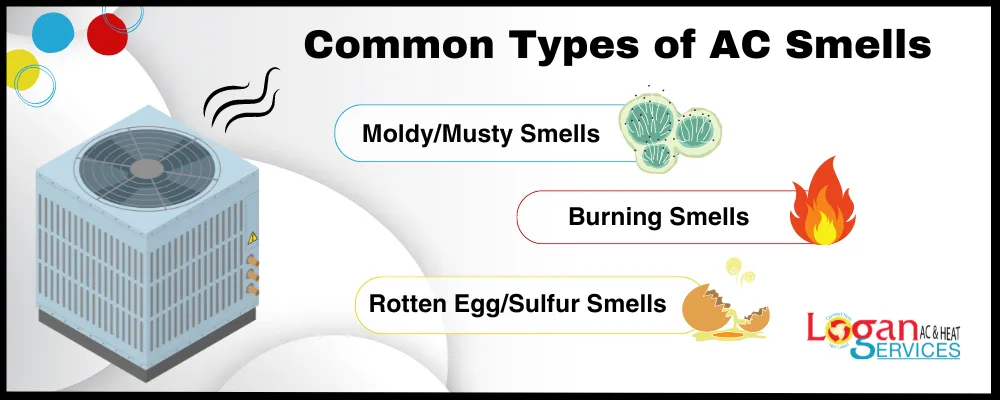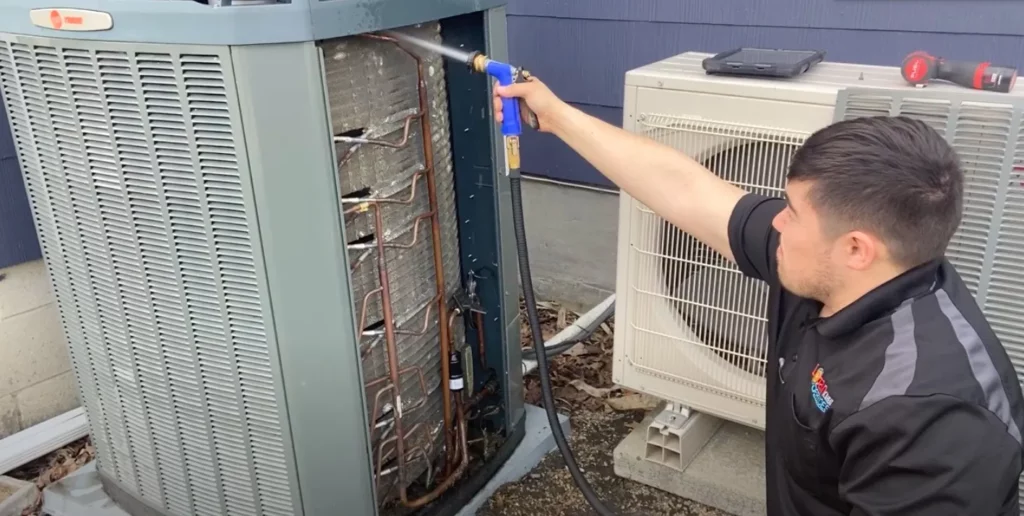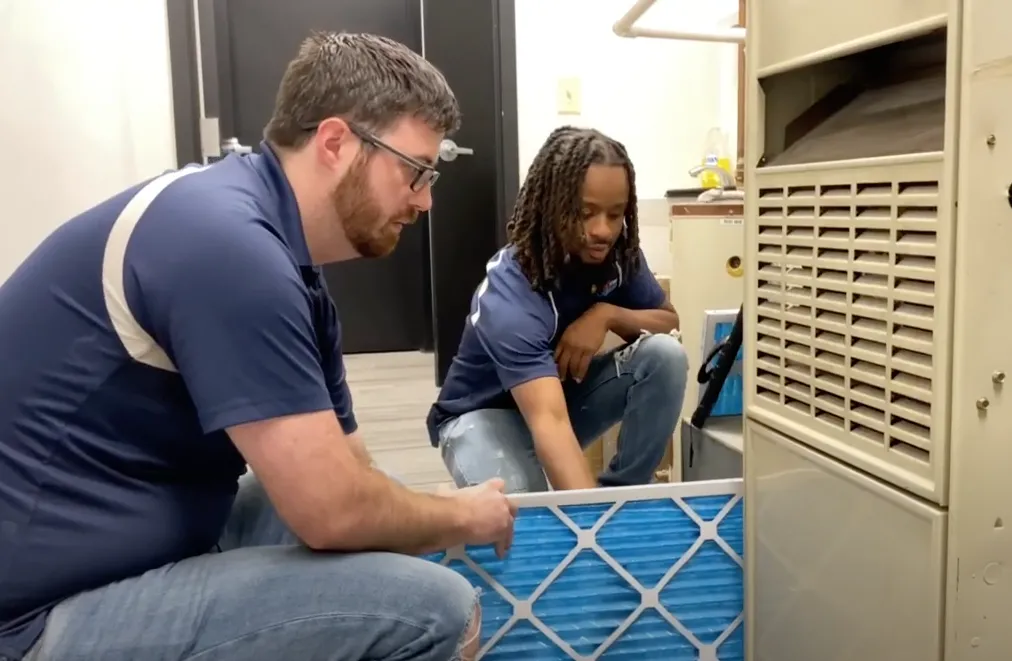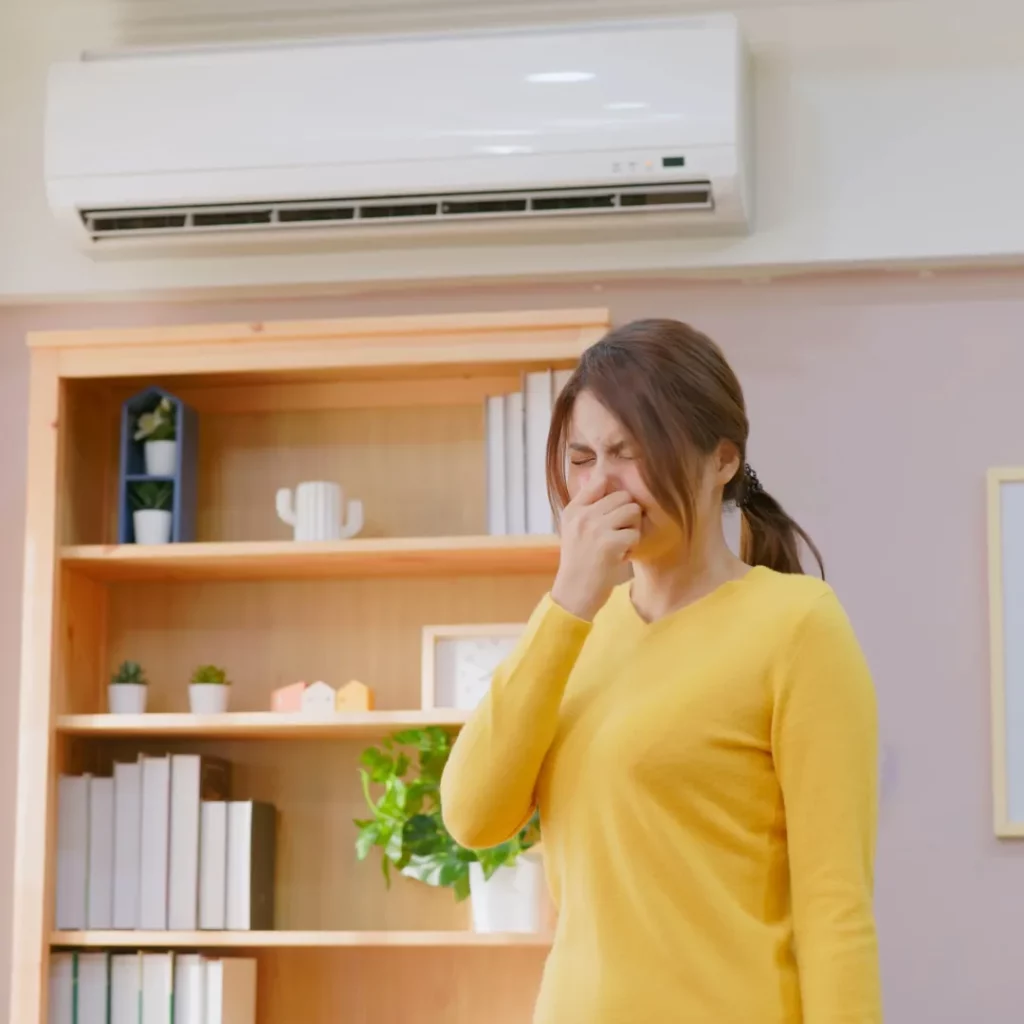Is your AC giving off unpleasant smells? What do these smells mean and how can they be eliminated? In this article, we will explore the common types of AC smells that homeowners may encounter, their causes, and how they can be solved. From musty smells to burning and sulfur-like odors, we’ll cover it all. Additionally, we’ll discuss the importance of preventive maintenance and proper AC usage to avoid future odor problems.
Common Types of AC Smells
When your air conditioning (AC) system is working correctly, it should circulate clean and odorless air throughout your home or office. However, at times you may notice some unusual odors coming from your AC unit, indicating potential issues that might need to be addressed. In this article, we will discuss some common types of AC smells and their possible causes.
Musty Smells
Excessive humidity can have a distinctive musty odor that can circulate through your AC system if left untreated. Damp air can not only cause unpleasant smells but can also adversely affect your indoor air quality and trigger health issues like allergies, asthma, and respiratory problems.
Burning Smells
If you ever notice a burning odor coming from your AC unit, it’s essential to turn off your system immediately, as it may indicate an electrical issue or component overheating. Ignoring this can lead to severe damage to your AC unit and even pose a fire hazard.
Rotten Egg or Sulfur Smells
A rotten egg or sulfur smell coming from your AC unit could be a sign of a natural gas leak, which can be extremely dangerous to your health and safety. In this case, you should evacuate your home immediately and contact your gas company and a qualified technician for assistance.

Causes and Solutions for AC Smells
Now that we’ve identified some common types of AC smells, let’s dive into their causes and learn how to address them effectively.
Moisture Buildup
Moisture buildup within your AC system creates issues that will need to be resolved. This moisture can come from various sources, such as condensation on the evaporator coil, a clogged condensate drain, or high indoor humidity levels. Let’s explore some ways to combat excess humidity in your home.
Cleaning the Condensate Drain Line
An effective way to reduce moisture buildup is by cleaning your AC’s condensate drain line regularly. This line can become clogged with dirt, debris, or even algae, causing water to back up and accumulate in your AC system. Clean the drain line at least once a year and check for clogs to maintain a clean and functioning AC system.
Using Dehumidifiers or Humidity Controllers
If you live in a region with high humidity levels, you might consider using dehumidifiers or humidity controllers to maintain optimal indoor humidity levels. These devices can help reduce the moisture content in the air, improving your overall indoor air quality.
Electrical Issues
Electrical issues are another common cause of AC smells, especially burning odors. A malfunctioning motor, worn wiring, or a failed capacitor are just a few of the potential culprits. To identify and resolve electrical issues in your AC unit, consider the following strategies:
Identifying Faulty Components
Inspecting your AC unit for damaged or malfunctioning components is vital for preventing electrical issues. Look for signs of overheating, such as melted insulation, charred wires, or a burnt smell around your AC unit. If you find any of these symptoms, it’s essential to address the issue promptly to avoid severe damage or potential fire hazards.
Professional Inspection and Repair
When dealing with electrical issues, it’s always best to consult a professional HVAC technician. They have the knowledge, expertise, and tools needed to diagnose and repair your AC system safely and effectively. Regular professional maintenance can also help prevent electrical issues by catching problems early and making necessary adjustments before they become major concerns.

Gas Leaks
A rotten egg or sulfur smell from your AC unit can be an indication of a gas leak. Natural gas or propane leaks from gas-fired furnaces are not only hazardous to your health but can also lead to explosions or fires if left untreated. If you suspect a gas leak, take the following precaution to ensure your safety:
Turning off the Gas Supply
If you can do so safely, immediately shut off the gas supply valve to your home. This will help prevent the gas concentration from reaching dangerous levels and mitigate the risk of an explosion.
In conclusion, by detecting and addressing common AC smells, you can maintain a safe, functioning, and odor-free air conditioning system. Regular AC maintenance, professional inspections, and proactive solutions can go a long way to preventing unpleasant odors and ensuring optimal indoor air quality.
Preventive Maintenance and Proper AC Usage

Preventive maintenance and proper AC usage are essential for a fresh-smelling and comfortable home. Here, we’ll explore various ways to ensure that your AC is working efficiently and providing you with the best possible indoor air quality. We’ll discuss regular cleaning and maintenance, ensuring adequate ventilation, and replacing air filters – all crucial factors in maintaining a healthy living environment.
Regular Cleaning and Maintenance
The importance of regular cleaning and maintenance of your AC system cannot be overstated. Over time, dirt, dust, and debris can accumulate on the various components, reducing efficiency and contributing to foul odors. To prevent this, it’s crucial to have a professional perform an annual maintenance check on your system, inspecting for any potential problems, and replacing parts as needed. This may include cleaning evaporator coils, checking refrigerant levels, and assessing the overall condition of the system.
In addition to hiring a professional, you can also maintain your AC system by regularly removing and cleaning the filter, removing debris from the outdoor unit, and wiping down the vents to remove dust and dirt buildup. Keep in mind that neglecting to clean your AC system can contribute to reduced efficiency and can even result in costly repairs or replacements.
Ensuring Adequate Ventilation
Did you know that ensuring proper ventilation in your home can significantly reduce indoor air pollution? It’s vital to keep a steady flow of fresh air into your living space, which can be achieved through regular use of exhaust fans and utilizing your HVAC system’s fresh air intake. These systems can help to remove stale indoor air, without impacting your indoor temperature.
Tips for improving your home’s ventilation include using exhaust fans in moisture-prone areas such as bathrooms and kitchens, opening windows during milder weather conditions, and making use of a programmable thermostat to maintain a comfortable and consistent temperature. Moreover, avoid blocking vents and air returns with furniture or other obstacles, as doing so can interfere with proper airflow through your home.
Replacing Air Filters

Replacing your AC’s air filter is one of the most simple and effective ways to maintain a fresh-smelling home. Air filters trap dust, pollen, pet dander, and other airborne pollutants, which can contribute to unpleasant odors if not removed regularly. Consequently, a clogged air filter not only affects your indoor air quality but can also decrease the overall efficiency of your HVAC system. Experts typically recommend changing your air filter every 30-60 days for optimal efficiency and air quality. However, if you have pets, allergies, or other factors influencing the air quality in your home, you may want to replace them more frequently.
When to Call for Professional AC Help:
If the smell persists, you may need an expert opinion to help you tackle this project. Logan Services A/C, Heat & Plumbing can help you address AC smells in your home by diagnosing the source of the smell and providing the necessary repairs or maintenance. If you are experiencing AC smells in your home, contact Logan Services A/C, Heat & Plumbing today for a service call. After identifying the source, we’ll provide the necessary repairs or maintenance to get your AC unit back to working properly.
Staying Informed and Proactive for a Fresh-Smelling Home
Preventive maintenance and proper AC usage play a vital role in maintaining a fresh-smelling, comfortable, and healthy living environment. By regularly cleaning your AC system, ensuring adequate ventilation, and replacing air filters as needed, you’ll reduce indoor air pollution, improve overall air quality and extend the life of your HVAC system. Stay informed, proactive, and keep your home smelling fresh by investing time and effort into these essential tasks.





















